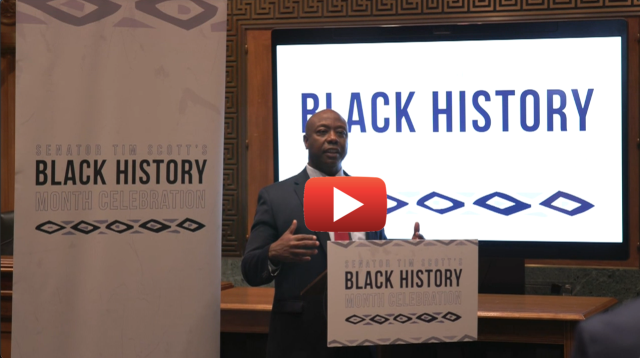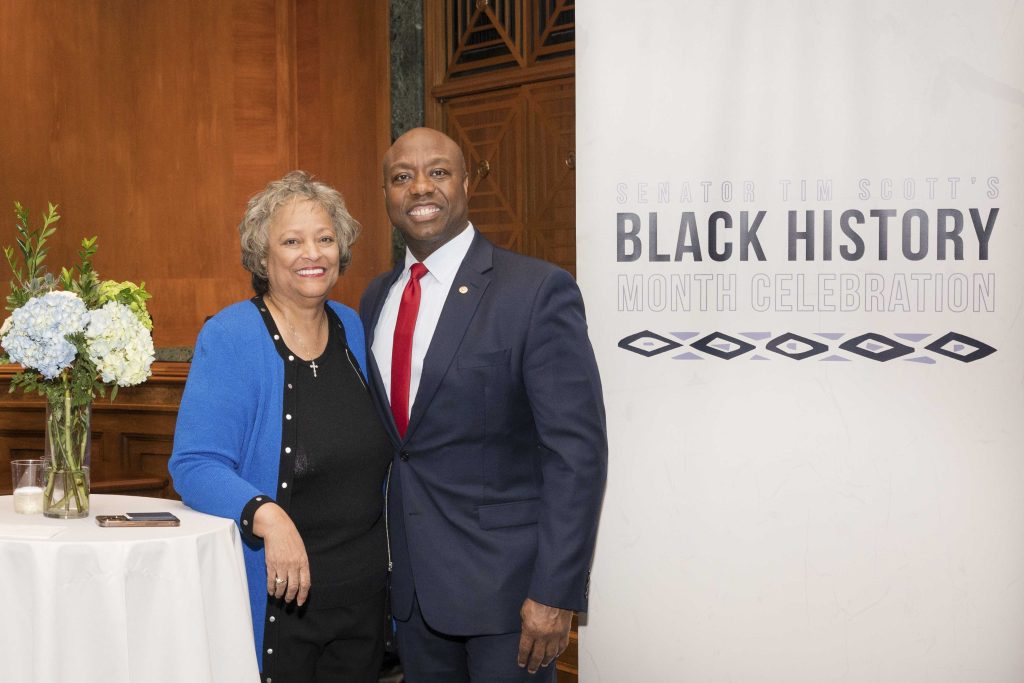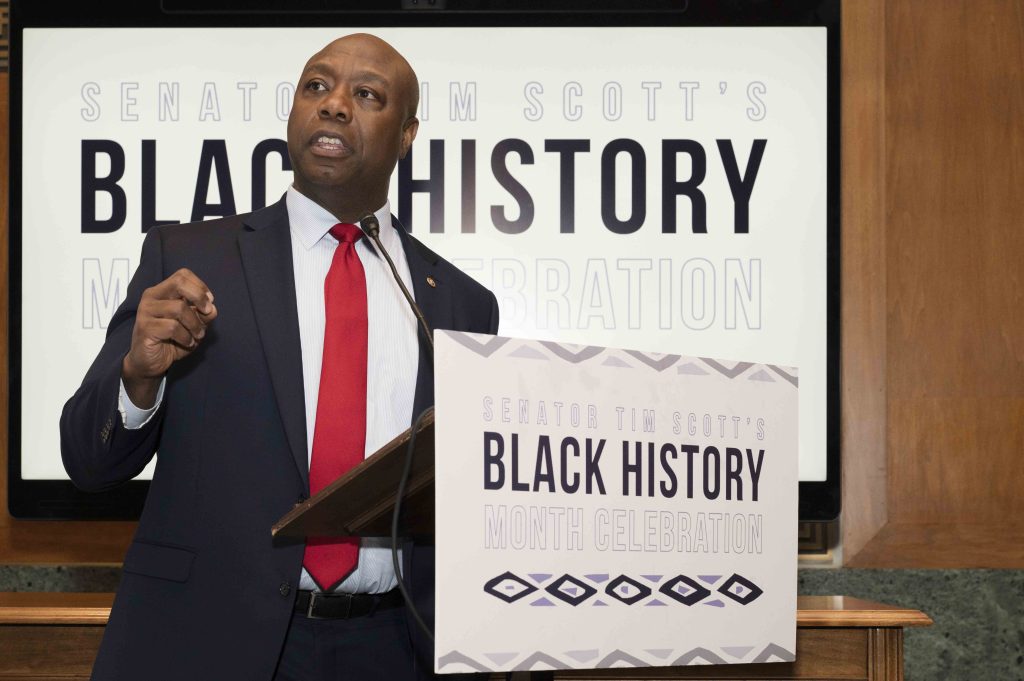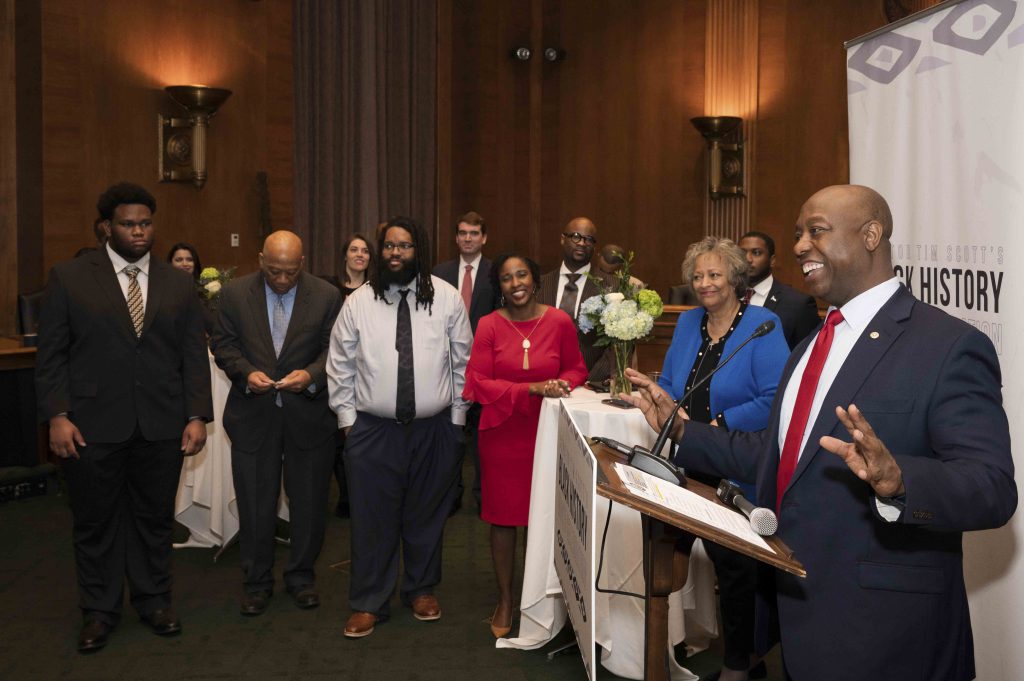- Thursday, February 29th, 2024
Sen. Scott Hosts Black History Month Reception
WASHINGTON — Last night, U.S. Senator Tim Scott (R-S.C.) welcomed prominent African American conservatives to the United States Capitol to celebrate Black History Month, highlight the achievements of conservatism within the African American community, and foster discussion about the work that still needs to be done to promote greater economic opportunity. Senator Scott was joined by former Secretary of the Commonwealth of Virginia and Heritage Foundation President Kay Coles James. Photos and video from last night’s reception can be found here.
“As we celebrate Black history, so often we look back at history – whether it’s the 1960s or Jim Crow South – but one of the things we can conclude by looking at history is that the struggle has been, and in some areas, continues to be real,” said Senator Scott. “One of the things we have to do is have this conviction that all things are still very much possible, and they are more possible today than they have ever been. And the more we lean into it, the more we form the relationships, the more we use our history as a place to stand higher farther down the road – the more likely we are to pave a path for others to follow.”

Watch Senator Scott’s remarks here.



Prior to the reception, Senator Scott, in his capacity as the top Republican on the Senate Committee on Banking, Housing, and Urban Affairs, hosted a roundtable with Black investors and business founders to discuss ways to improve minority communities’ access to capital and the ability to build wealth. Senator Scott also highlighted his legislative framework, the Empowering Main Street in America Act, which will boost avenues for capital formation and increase access to U.S. capital markets – helping to create more high-paying jobs and investment opportunities in minority communities across the country. More information on his roundtable can be found here.
Earlier this month, Senator Scott’s resolution commemorating Black History Month and the important contributions made by Black Americans throughout United States history was approved by the Senate.
BACKGROUND
Throughout his time in the U.S. Senate, Senator Scott has championed initiatives to promote opportunity for Black Americans:
- Senator Scott introduced the FUTURE Act to advance historic and permanent funding for historically black colleges and universities (HBCUs). It also provided continued support for HBCUs and other minority-serving institutions of higher education whose funding was set to expire. The legislation was signed into law by President Trump in December 2019.
- Senator Scott’s recently introduced Credit Access & Inclusion Act allows landlords, telecom companies, and utility providers to report on-time payment data to credit bureaus. Traditional methods have left more than 50 million Americans behind in attaining a fair credit score.
- Senator Scott’s Connecting Minority Communities Act appropriated $285 million toward a pilot program to provide grants to HBCUs to expand access to broadband. It also established an “Office of Minority Broadband Initiatives” at the National Telecommunications and Information Administration (NTIA). The bill was signed into law as part of the December 2020 omnibus legislation.
- Senator Scott introduced the HBCU-Africa Partnership Act of 2023 to foster greater partnerships between HBCUs and U.S. foreign policy institutions and promote exchange opportunities with African partners.
- Senator Scott led the way in securing $1.7 billion in direct assistance to HBCUs as they responded to the pandemic.
- Senator Scott fought to include a provision in the CARES Act that directed $10 million to the Minority Business Development Agency to provide technical assistance to minority businesses seeking federal resources. $1 billion was set aside exclusively for HBCUs and other minority-serving institutions (MSIs).
- Senator Scott’s Diversifying Investigations Via Equitable Research Studies for Everyone (DIVERSE) Act allows the U.S. Department of Health and Human Services (HHS) to issue grants or enter into contractual arrangements to support education, outreach, and recruitment for clinical trials for diseases with disproportionate impacts on underrepresented populations. Provisions of the bill were included as part of the December 2022 omnibus legislation.
- The Senator’s Opportunity Zones initiative was passed as a part of the 2017 Tax Cuts and Jobs Act. With $75 billion committed to low-income areas, at least $48 billion has already been invested in minority and low-income areas.
- The Senator’s Justice for Victims of Lynching Act criminalized lynching and was signed into law in 2022.
- Senator Scott has been a strong advocate of community-driven efforts aimed at reducing health disparities—having introduced the REACH Act and ensuring the unanimous passage of a resolution recognizing Minority Health Month every year, even before the issue gained national attention during the pandemic.
- Senator Scott’s Minority Business Development Act codified the Minority Business Development Agency (MBDA) and authorized the creation of regional MBDA offices and rural business centers to be administered through HBCUs. The bill was signed into law in November 2021.
- Senator Scott successfully lobbied the Federal Emergency Management Agency (FEMA) to reform its policies that discriminated against Black homeowners has helped tens of thousands of people get the help they need after natural disasters.
- The Senator spearheaded the introduction of the Fair Access for Farmers and Ranchers Act in the 115th Congress, ultimately getting the bill signed into law in the 2018 Farm Bill, and he later urged the Department of Agriculture (USDA) to implement those provisions to benefit owners of heirs’ property – an issue that overwhelmingly impacts African American land ownership, of which 60 percent is projected to be heirs’ property.
- Senator Scott championed the Ignite HBCU Excellence Act, which invested in infrastructure projects at HBCUs, allowing them to maintain and expand their transformational work. Key provisions of the bill were signed into law as part of December 2022 government funding legislation.
- Senator Scott helped create the John Lewis Civil Rights Fellowship at the Department of State for the study of non-violent civil rights movements around the world, through passage of his bill in the FY24 NDAA.